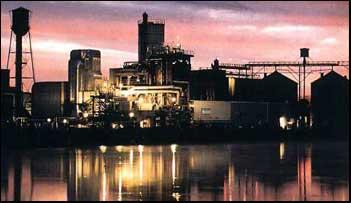Biomass Success Stories: Lake Charles, LA

Agrilectric Power in Louisiana Runs “Zero Waste” Biomass Facility Using Rice Hulls
Biomass facilities across the country generate clean, renewable energy from organic matter that is, in most cases, wood waste material.
The Agrilectric Power Partners facility in Lake Charles, Louisiana – part of a rice mill complex owned by the 115-year-old Powell Group – certainly produces renewable energy. Instead of wood, however, its fuel of choice is rice hulls.
Rice is a huge industry in southwestern Louisiana. According to the USA Rice Federation, the rice processing and production account for about $300 million for the state, making it Louisiana’s second largest industry.
A perennial challenge to rice millers has been how to dispose of rice hulls after the “meat” of the plant has been extracted to sell as a food product for humans and animals. While small in size, a rice hull is made of well over 95% silica – an extremely hard and durable substance that is most typically found in nature as sand or quartz. Silica is a notoriously difficult byproduct to dispose of; it can take decades for discarded rice hulls to completely biodegrade when buried or placed in a landfill.
In the early 1980s, well before biomass began to be used as a viable source of energy in California, Agrilectric came up with a brilliant solution to the problem of rice hull disposal: it would burn the hulls in a boiler to power the rest of its operations.
This method was very successful in reducing waste and disposal costs and in saving energy costs for the rice mill. The company sells the excess power from the 12 MW facility to a local utility on the electric grid. It also discovered that the ash produced from burning rice hulls was a sought-after commodity that it could sell for use as an insulator in the steel making industry.
In recent decades, as the biomass industry began to grow and become increasingly regulated, Agrilectric noticed one more benefit to its rice hull disposal method: this form of biomass produces very few emissions, as its moisture content is very low. Additionally, aside from the trucks used to transport the raw rice product to the facility, materials are moved within the facility pneumatically – meaning there are very few transportation-related emissions.
As Tom Spies, Chief Operating Officer of Agrilectric Power, likes to put it: “Just about the only waste product produced by our entire complex, is lunch leftovers.”



